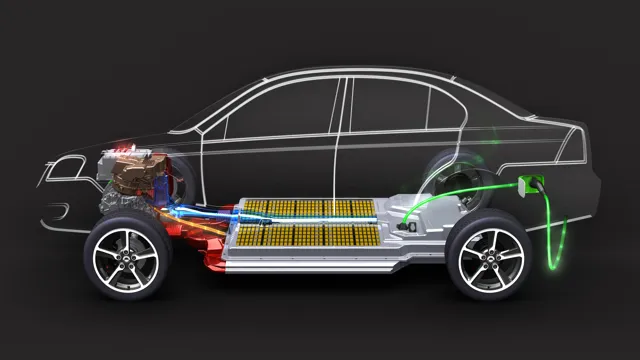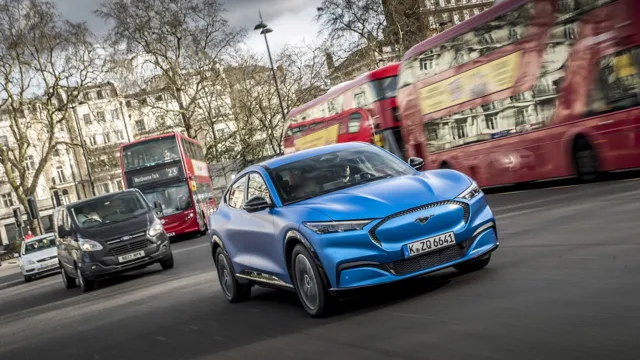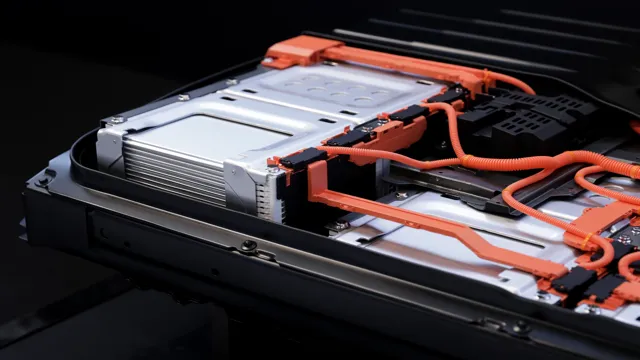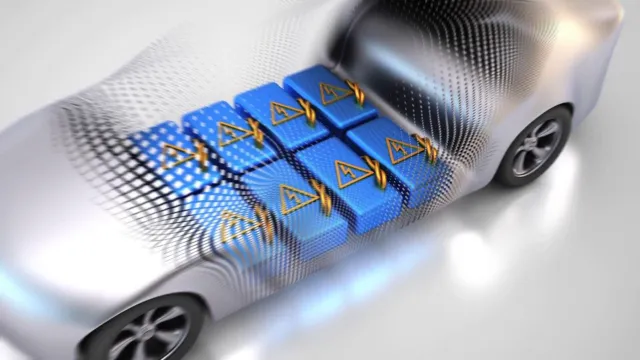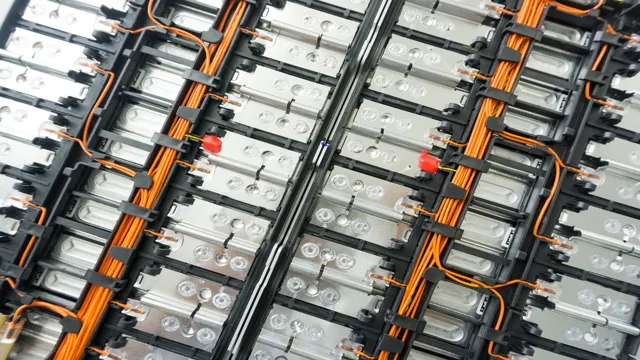Revving Up for Change: Why the Electric Car Industry Is Stalled on Promised Battery Improvements
As electric cars become more popular, one of the biggest challenges the industry faces is the development of reliable and efficient batteries. The promise of electric vehicles being a green and sustainable alternative to traditional gasoline cars has been hindered by a stall in battery technology improvements, which, in turn, could stall prospects for the electric car market. Despite the hype surrounding advancements in battery development, the industry has yet to deliver on the promises it made.
The high costs and the limited range of electric vehicles are significant drawbacks for drivers, and without improvements to battery technology, the electric car market may struggle to gain widespread acceptance.
Industry Growth Slowed by Battery Challenges
While the electric car industry continues to gain popularity, its growth has been slowed by the challenges associated with batteries. Prospects for electric cars have stalled as the promised battery improvements necessary for mass adoption have not yet been achieved. Battery technology continues to be a significant barrier to the success of electric cars, with issues such as limited driving ranges, long charging times, and high costs.
Automakers and battery manufacturers are working hard to improve the technology behind electric car batteries, but there is still a long way to go. While lithium-ion batteries have been the go-to power source for electric cars, research into new battery technologies such as solid-state and lithium-sulfur batteries offers hope for significant improvements. As battery technology continues to improve, the electric car industry is poised for growth and will eventually become an integral part of the transportation industry.
Global Electric Car Sales: Data Shows Stalling
Global electric car sales figures have shown a somewhat concerning trend, with growth in this industry appearing to be slower than anticipated. Experts maintain that this has largely been attributed to challenges faced by manufacturers, such as the development and cost of batteries. Despite the increased focus on sustainability and reducing our carbon footprint, the electric vehicle market growth appears lacking.
While electric cars are now more prevalent than ever, drivers are still reliant on battery technology that is not yet cost-effective. However, the future of electric cars remains bright, with constant innovation and development towards affordable, long-lasting electric vehicle batteries.
Battery Shortcomings: Prospects Wait for Expected Improvements
The battery is the cornerstone of almost every modern electronic gadget, from smartphones to electric cars. But, despite being integral to our lives, batteries still come with shortcomings that hamper the growth of industries that rely on them. For instance, batteries still have limited capacity, meaning that they can’t hold as much energy as we might want them to.
They also suffer from memory effect, where they lose some capacity when they are not fully discharged. Another major limitation of batteries is their lifespan. While developments in battery technology have helped extend the lifespan of batteries, they still degrade over time, leading to a reduced capacity.
All of these factors combine to slow the growth of industries that rely on batteries, such as electric cars and smartphones. However, there is hope for the future. Scientists are tirelessly working to improve battery technology, and we can expect better batteries with improved capacity, longer lifespans, and improved performance to arrive soon.
As battery technology continues to improve, industries that rely on them will continue to grow, and we’ll enjoy even more innovative and exciting products that will change how we live.
Battery Improvements: Current and Upcoming Trends
Despite the widespread interest in electric cars, their progress has been hampered by concerns over battery technology. For many consumers, the driving range and charging times associated with electric vehicles are still seen as major drawbacks, even with the growing availability of charging infrastructure. Fortunately, there is promising news on the horizon.
Advances in battery technology are expected to improve these issues, making electric cars a more attractive proposition for drivers. From new lithium-ion chemistries to solid-state batteries, engineers are developing a range of solutions that could revolutionize the sector. While some of these technologies are still in the research stages, many are being tested in the real world and are showing impressive results.
As these improvements become more accessible, it’s likely that electric cars will become more commonplace on our roads, providing an eco-friendly alternative to traditional fossil fuel-powered vehicles.
Nano-Silicon and Solid-State Batteries: Technologies and Potential
Solid-state batteries and nano-silicon are two groundbreaking technologies that hold immense potential for improving battery performance and revolutionizing the energy storage industry. Solid-state batteries, in particular, offer several advantages over traditional lithium-ion batteries, such as higher energy density, longer lifespan, increased safety, and faster charging rates. On the other hand, nano-silicon technology has shown promising results in improving the capacity and stability of batteries, enhancing their durability and efficiency.
These developments are crucial in addressing the limitations of current battery technologies and providing more sustainable and reliable energy solutions. With ongoing research and advancements, there is no doubt that we will see more significant breakthroughs in battery technology in the coming years, leading to more efficient and cost-effective energy storage systems for a wide range of applications.
Battery Cost Reductions and Fast Charging: A Race against Time
Battery cost reductions and fast charging are two of the most pressing concerns in the electric vehicle industry today. The current trend of battery improvements is moving towards more efficient and long-lasting batteries. Companies are looking for ways to make batteries smaller, lighter, and cheaper while maintaining performance.
Additionally, the focus is now on fast-charging solutions, with the goal of reducing the time it takes to charge an EV to minutes instead of hours. The race is on to develop new battery technologies and charging infrastructure to support the growing number of electric vehicles on the road. This is where the industry looks to the latest research and development for solutions.
One of the current trends in battery advancements is the use of solid-state batteries. By replacing the liquid electrolyte in traditional batteries with a solid one, EVs can enjoy a lighter and more energy-dense battery, which translates to longer ranges. Solid-state batteries are also less prone to overheating, which is a prominent concern in EV battery packs.
Another trend is the use of lithium iron phosphate (LFP) batteries, which are less expensive to manufacture than traditional lithium-ion batteries. LFP batteries are also safer and have a longer lifespan, making them ideal for commercial fleets and residential use. Additionally, the focus on fast-charging technology is becoming more central.
Companies are working on developing ultra-fast charging stations that can add significant mileage range in mere minutes. The race to develop a 350 kilowatt-hour electric vehicle charging standard has already seen some success, with companies such as Ionity and EVgo leading the way. The goal is to have EVs charged anywhere from tens to hundreds of miles within just a few minutes.
An excellent analogy would be comparing fast-charging technology to a gas station, where drivers can refuel in just a few minutes before continuing their journey. In conclusion, the electric vehicle industry is evolving at breakneck speed. Battery cost reductions and fast charging times are necessary for its widespread adoption.
Electrification and the Future of Battery Innovation
Electrification and Battery Innovation As the world shifts towards electrification, the demand for better battery technology increases. Current trends show a focus on improving the energy density of batteries, allowing for longer ranges and faster charging times. One trend being explored is solid-state batteries, which have the potential to offer higher energy densities and improved safety.
Another trend is the use of silicon anodes, which can increase the energy density of lithium-ion batteries. Additionally, researchers are investigating the use of new battery chemistries such as lithium-sulfur and lithium-air, which promise even higher energy densities. As battery technology improves, it will open up new possibilities for electrification in transportation and other industries, leading to a cleaner and more sustainable future.
Prospects of Future Battery Improvements on Electrification
Electric cars hold enormous promise for the future, but their prospects may be stalling as we await promises of battery improvements. The electric car market has grown rapidly in recent years, but there are still a number of obstacles to widespread adoption. One of the biggest is the range that electric vehicles can travel on a single charge.
Current batteries offer between 100 and 300 miles of range, but this is still a far cry from the 300 to 400 miles offered by traditional gasoline engines. As a result, many drivers remain hesitant to switch to electric despite the environmental benefits. However, the prospects for future battery improvements are bright.
Researchers are exploring a range of new materials and technologies that could increase the energy density, reduce the cost, and improve the safety of batteries. From solid-state batteries to lithium-sulfur and metal-air batteries, there are many exciting developments on the horizon. These improvements could make electric cars not just a viable option, but the preferred choice for drivers looking for a reliable and environmentally-friendly vehicle.
Industry Experts and Analysis on Future Battery Developments
The future of battery developments promises exciting prospects for electrification. Industry experts point to the emergence of new cathode materials that could increase energy density, making batteries smaller and more efficient. Moreover, solid-state batteries that use a solid electrolyte instead of liquid offer higher energy density, longer lifespan, and greater safety.
In addition, advancements in silicon anodes and lithium-sulfur batteries could provide longer-range capabilities and faster charging times. The continued development of wireless charging technology could also revolutionize battery usage by eliminating cables and connectors. These innovations will have a profound impact on the transportation sector, as electric vehicles become more widespread and accessible.
The future is bright for battery advancements, and we can’t wait to see where the technology will go!
Technology’s Future Impact on Electric Car Sales
With electric car sales increasing year after year, it’s becoming more evident that electric cars are the future. However, the industry is still facing some challenges regarding battery performance and affordability. Battery costs are expected to drop significantly over the next decade, and with technological advancements, battery density is expected to rise as well.
This will lead to longer ranges and shorter charging times, making it even easier and more convenient for consumers to switch to electric cars. Furthermore, with more and more manufacturers entering the market, competition will drive innovation and improvements in battery technology. With all of these advancements on the horizon, it’s exciting to think about the possibilities for electrification.
The future looks bright for electric cars, and it’s safe to say that we’re just at the beginning of the electrification revolution.
Conclusion: Expectations for Battery Improvements and Electrification Growth
Despite the promising potential of electric cars, it seems that their prospects have hit a bit of a speed bump as they wait for the promised battery improvements. Perhaps the bright future of electric cars is not too far down the road, but for now, it looks like their acceleration has been put on hold while they recharge their batteries.”
FAQs
What is currently stalling the prospects of electric cars?
The promised improvements in battery technology have not yet been developed.
How important are battery improvements for the electric car industry?
Battery improvements are crucial for making electric cars more practical and affordable for consumers.
When are these promised battery improvements expected to be available?
There is no clear timeline for when the promised battery improvements will be available, which is causing uncertainty in the electric car industry.
Are there any other factors impacting the growth of the electric car industry?
Yes, factors such as limited charging infrastructure and the high cost of electric cars are also hindering the growth of the industry.
